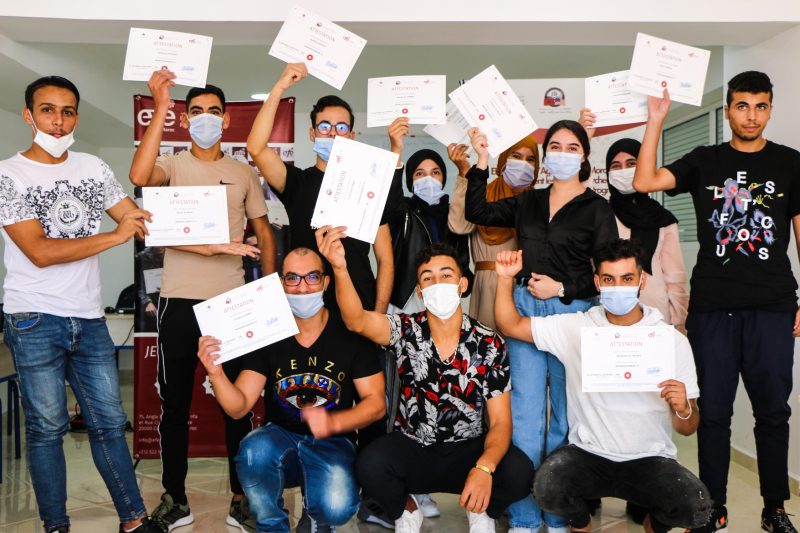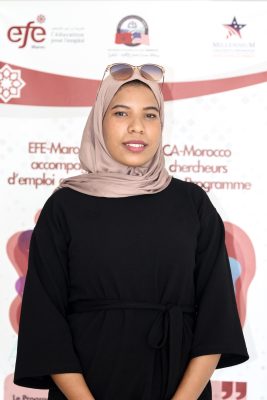
MCA-Morocco
Trainees in Morocco celebrate receiving their work readiness certificate, their final preparatory step before starting new jobs.
With elevated rates of youth unemployment and one of the world’s lowest rates of female labor force participation, Aziza is far from alone in her struggle. Fortunately, the $460 million MCC – Morocco Employability and Land Compact is working to change that.
In 2022, Aziza had her lucky break when she connected with an MCC compact program called Results-based Financing for Inclusive Employment. Under traditional funding mechanisms, funders choose activities thought to bring about change, and implementers are paid to implement these agreed activities, regardless of their effectiveness. Results-based Financing (RBF) mechanisms tie funding to measurable results, creating greater accountability and transparency in the use of funds, while also generating greater incentives for cost-effectiveness and giving providers more flexibility to adapt their programs to complex social problems.

Aziza Ez Zouini struggled for more than 4 years to find a job after completing her studies, until she found support from MCA-Morocco grantee EFE.
In March 2019, MCA-Morocco signed agreements with six NGOs and two private employment agencies. Under these agreements, these eight providers agreed to train 6,000 vulnerable jobseekers, with women as the targeted trainees of more than 70 percent of training slots. Importantly, in line with the principles of RBF, these providers would only receive full payment if the jobseekers met formal job placement and six-month job retention targets.
After the program launched, there was such excitement and early signs of success that another Moroccan government agency, the National Institute for Human Development (INDH, per its French acronym), requested the support of MCA-Morocco to replicate this program based on the capacities developed by the providers and the mid-course learning of the first pilot, adapted to the INDH’s unique demographic and geographical targeting. For this pilot, 23 agreements were signed with six of the eight RBF service providers and two new providers targeting job placement and retention results for more than 2500 people in 23 districts across Morocco.
This second pilot serves as an especially exciting experiment in developing a strong cadre of providers who are demonstrating their ability to deliver results for jobseekers and the firms who go on to employ them. In addition, many of the providers are training and placing job seekers beyond the large regional capitals and cities, in smaller cities and semi-urban areas, where jobseekers struggle even more to put their skills to work in a formal job.
With a broader view to ensuring the sustainability of RBF mechanisms in the field of employment, MCA-Morocco has helped strengthen the capacity of Moroccan government agencies in applying RBF to their programs and initiatives. To disseminate results to date and share lessons learned, MCA-Morocco has led regional seminars for the promotion of RBF tools with a view to raising awareness among organizations working towards employment and inclusion and serving as a catalyst for learning and innovation in the management of employment and inclusion programs, ensuring that resources are focused on delivering results rather than paying for inputs.
Given the huge interest in the use of results-based financing for employment programs in Morocco, a special emphasis has been placed on an exhaustive, intentional learning agenda, ensuring MCC, MCA-Morocco, and the various partners in the Moroccan government are learning from this innovative experiment. In fact, just last week, an international seminar in Rabat provided a forum for exchange on the learnings from Morocco’s big bet on RBF tools and approaches.
True to the program’s name, the excitement around the program is based not just on its innovative design and approach, but because of its ability to show results for people like Aziza across the country. Thanks to support from this program, Aziza was able to get connected to a job after years of struggle to put her skills to use. In addition to supporting interview skills and connecting her with job opportunities, Aziza said the program provided her with essential soft skills: “I learned how to define my goals, how to communicate in a positive way, and how to manage […] teamwork, […] a skill all young people should have.”
We at MCC are optimistic by adapting to the contexts and needs of citizens, that this type of program can deliver improved results across programs in Morocco and other countries around the world.

